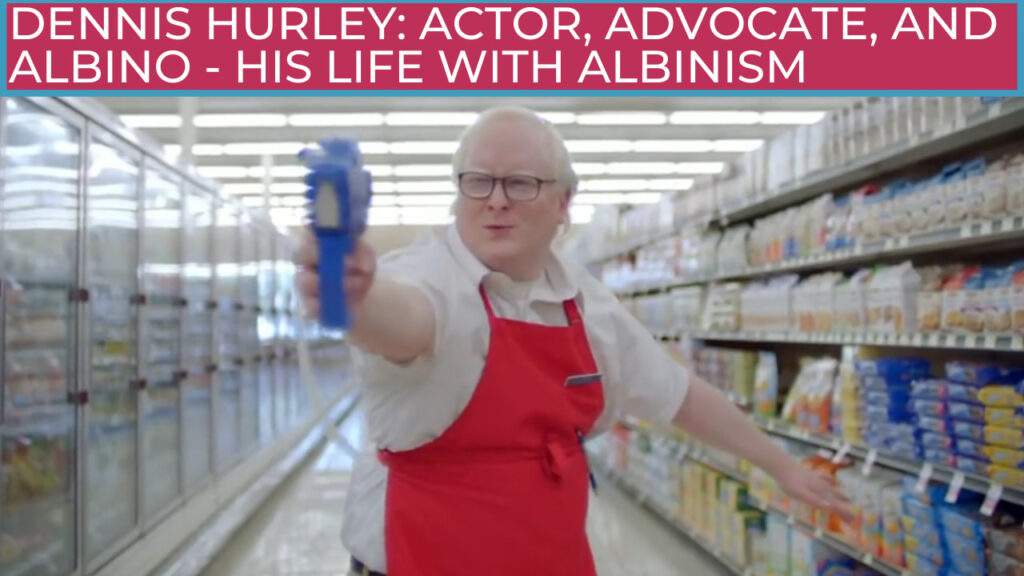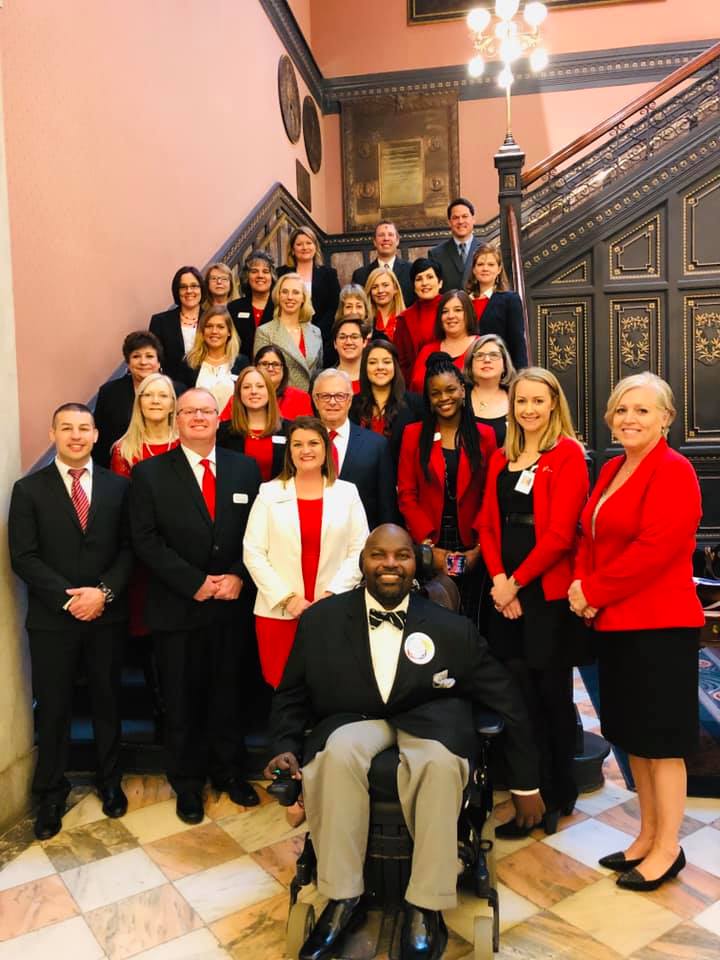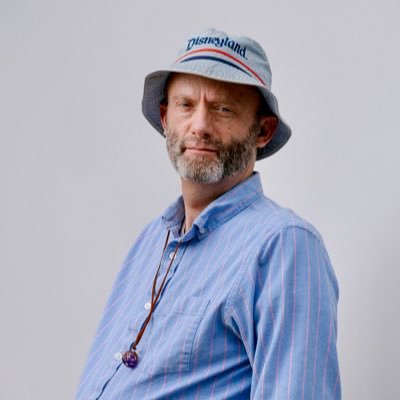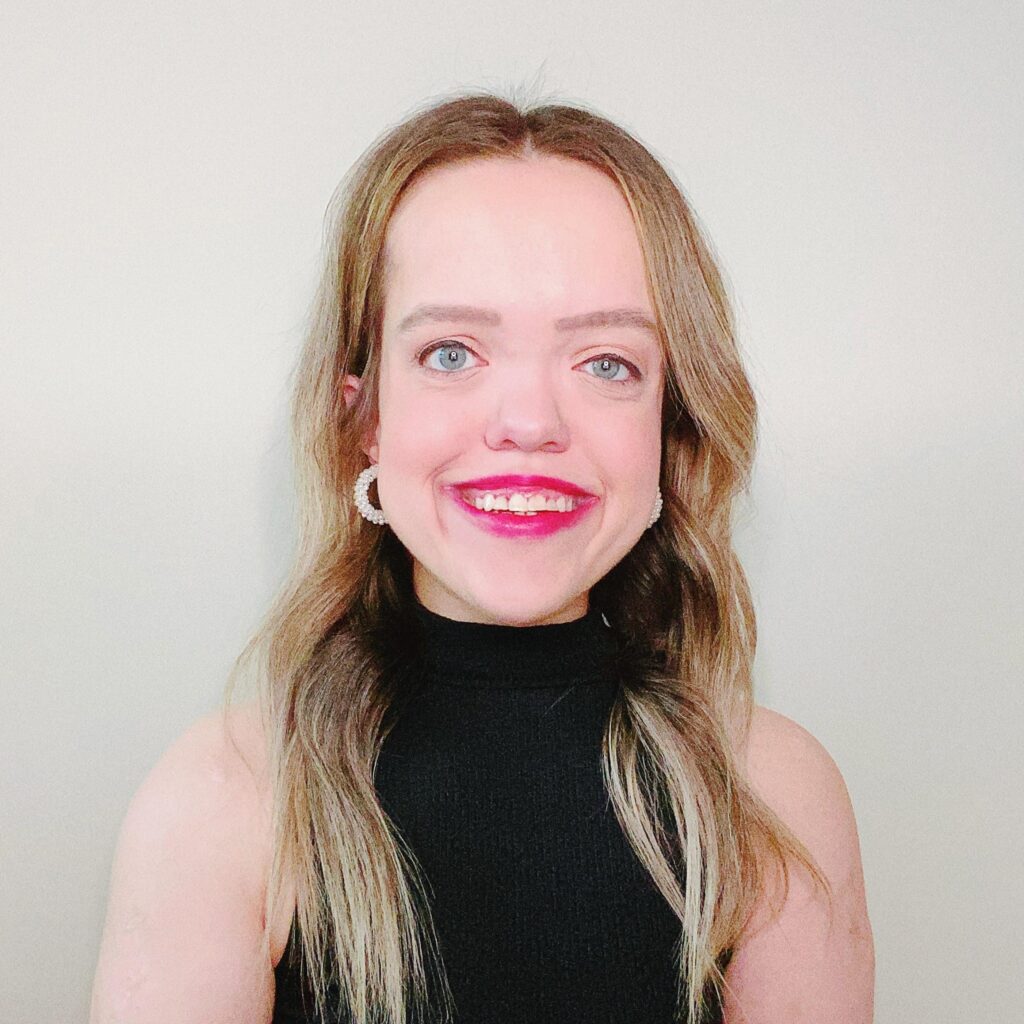Dennis Hurley is an actor, advocate, and albino. He has been living with albinism since birth and has spoken about his experiences in the media. Dennis will be participating at the upcoming N.O.A.H. conference July in Orlando, Florida. In this Situation Positive podcast interview, Dennis talks about about his life with albinism and how it’s affected his ability to find work in the entertainment industry.
Below is the transcript of our interview. You can also click on the video above to watch the interview, or listen on one of our podcast channels by scrolling to the bottom of the page.
Dennis Hurley Interview
[00:00:00] Matt: You may know him from sitcoms, like Superstore,
[00:00:10] Dennis: Rats gave birth in nacho cheese. Cooked themselves to death. Yeah.
[00:00:22] Matt: Or, Justin Timberlake’s can’t fight the feeling video. We have actor and comedian, Dennis Hurley on our show, Dennis, welcome to the show.
[00:00:47] Dennis: Thank you, Matt. It’s great to be back. It’s been about five years. I’m so glad to be back on your podcast.
[00:00:54] Matt: Yeah. You know, and since then we’ve launched the new podcast Situation Positive. And we’re excited that you could join us on this journey. I know you wanted to be here today to talk about a conference you’re attending, is that correct?
[00:01:09] Dennis: Yes. Yes. This would be my fourth conference with NOAH. NOAH’s the national organization for albinism and hypopigmentation, they’re a non-for-profit charity. And their goal is to spread awareness and help people with this specific condition of albinism gain information and also fellowship within the community.
[00:01:38] Matt: I think community is important that sense of fellowship, that sense of knowing that you’re not going through it alone is so important. You know, not to get back to Justin Timberlake, but is NOAH going to make you dress like a happy grocery store guy and dance?
[00:01:57] Dennis: I, I think they need to do something different. Cause the last conference was at after we spoke last, it was 2018 and it was in Kansas City, Kansas, and yeah, Matt, you probably seen the video of me dancing with the kids on stage at the hotel in Kansas. But you know, it’s, it’s, it’s been a while since maybe they’ll have me do it again, but. They might try to one-up it. I don’t know. We’ll see.
[00:02:25] Matt: So where is the gathering this year?
[00:02:28] Dennis: The gathering kind of ironically is in Orlando, Florida. You know, w because a bunch of people with very pale skin, it’s, you don’t think of Florida being the place to go, but, but, you know, Disney World is there and a kid kids love Disney. So yeah, it’s going to be mid-July. At a hotel in Orlando and I’m looking forward to it.
[00:02:57] Matt: And are we doing any special performances this year at the conference.
[00:03:01] Dennis: Oh, that’s, that’s interesting because as you mentioned, the last conference in 2018 the 2020 conference was obviously online because of COVID, but in 2018, I ran a workshop for kids doing improv.
I don’t really teach that much, but I was happy to teach the kids some just basic you know, improv games back then. And as you said, I did the Timberlake video at the beginning to open the conference or we re-danced to it this year. It’s going to be a little different. There are still going to be lots of fun activities for kids, but they want to expand it.
You know, adults with, with albinism too. So we’re, we’re actually doing a comedy night and they’ve hired a local improv team and I’m going to open the show by doing about 10, 15 minutes of stand up, so.
[00:03:47] Matt: Oh, wow. That’s awesome.
[00:03:49] Dennis: Yeah, I’m excited because I’m a little rusty because of COVID. I haven’t been able to go out and do stand-up, like in Boston. Or back in the day in Los Angeles. So, but I’m sure I’ll groove right back into it.
[00:04:04] Matt: I was just going to ask are you back on the stand-up circuit yet?
[00:04:10] Dennis: No, no. The last time I did standup was December 2019. But I did, you know I did do. Sketch like some scenes last week in Roslindale, Massachusetts.
[00:04:29] Matt: Okay.
[00:04:30] Dennis: And it was great. I mean, I, as I said, I felt a little rusty, but it was great to be back. It’s just the thrill to be in front of people and, you know, try to make them laugh and. Definitely fun.
[00:04:41] Matt: Yeah. And, and, you know, we’re gonna, we’re going to post links to Dennis’s pages. So you know, when, when he gets back out there on tour, do yourselves a favor and go and see him. He’s hilarious. It’s an evening, well spent. Trust me. So talking a little bit about albinism right, we got into the conference, we talked a little bit about NOAH. Is it so it’s pretty inclusive, right? It’s for kids, adults anybody with albinism is welcome there, correct?
[00:05:16] Dennis: Yes. I remember it started in 1982 and I went to my first kind of mini gathering with this family from New Hampshire. And the best thing about it is that for kids. And I’m looking forward, you know, that they’re probably going to be a bunch of new kids this year, back in high school, in south shore Mass. You know, I was, I got very used to being, even though I had two brothers or two brothers with albinism, but they were farther apart and we never went to high school together.
I was very used to being the only one. Who looked like this who had very pale skin and very pale hair and, and the vision problem. That’s the other aspect of albinism that’s predominantly is that where most of us have some kind of vision problem, whether it’s astigmatism or a various degree of legally blind. What it is.
Most kids in this country or all over the world, they’re used to being the only one that looks like that in their school. So what the conference does is it gives them this perspective and they meet new friends. Who’s like, wow, someone’s going through a similar experience. Like me, someone who looks like me and they almost gain a new pen pal.
Because some, some kid from, you know, Sacramento, California could meet a kid from New England. And it’s just, that’s the best part to me to see like the friendships that blossom. And even I’ve seen it even romance can, can blossom. I’ve seen last year at the Kansas conference, I saw two 20 somethings who said, yeah, we met at the last conference and we started dating and we got married. Yeah, who knows.
[00:07:13] Matt: What a great story.
[00:07:14] Dennis: I know.
[00:07:16] Matt: Thinking a little bit about high school. Did you feel included in activities or do you feel like because you have albinism that it was, it was tougher for you socially?
[00:07:30] Dennis: The biggest hurdle was sports. Sports, I couldn’t Excel due to the vision problem. Socially, I felt there were so many various degrees of different cliques and different pockets of people. And I, I tended to, as, as the years, went on, gravitate towards the chorus, the drama club, and that’s where I really found Fellowship. And, and there was the normal degree of bullying because you know, that person looks very different, but as the years went on, that got less and less.And I was able to find kind of my niche of who my friends were. Yeah.
[00:08:17] Matt: So you were drawn to acting from an early age then?
[00:08:22] Dennis: Yeah. I don’t know. I have no idea why. I just know growing up, I love to watch movies. That’s that was always my favorite thing to do was to go to the movies, to watch movies at home, to watch movies with you all the time. We had of course, and make movies. So we, I loved it so much that we, you know, we just, just jumped into making it with those giant VHS camcorders. But that’s, that’s where it all began. I think.
[00:08:58] Matt: We had our own version of the Goldbergs going on.
[00:09:02] Dennis: We did, we had a mid-eighties Goldbergs filmed in the eighties. Right.
[00:09:08] Matt: So fast forward a little bit. You get out to LA and you start trying out and you know, like you mentioned that throughout high school and you kinda fit in with that chorus, that drama club acting. When you got out to LA and started auditioning. Did any of the albinism stuff kind of come back?
[00:09:34] Dennis: Well, by then I was in my mid-thirties and I was kind of much more comfortable in my own skin. So because I had previously spent five years in New York doing, doing acting in my twenties. But this, this, this last five years in the, you know, 2015 to 2020 in LA, I, I just embraced. The fact that I looked different was an asset. You know, I think we, we, we touched on this last time, but like I had accepted that there were roles I wasn’t going to get like the leading man role that like Bradley Cooper gets Brad Pitt, of course.
So that’s one end of the spectrum, but I was open to like all the different genres of auditions, whether it be for a comedy, a drama, or for a fantasy. That’s where I kind of have a leg up because taking it back to us, talking about that high school thing where I don’t look like anybody else, whereas early in high school or junior high or elementary school, that is a deterrent. And it’s like, oh, I can be singled out by bullies. That’s not a good thing. But in Hollywood, I looked different. That means I, I kind of, you know, I have a leg up because. Because there’s no one else going out for roles like me in a certain way.
[00:11:03] Matt: And when we talked last time, it was a little bit of, there were, what did we say? Kind of villain roles that were available. What were the kind of roles that cause I mean, to me, you could be a leading man on anything, but you know, my take. For, for the actual, you know, Hollywood, you said there were certain genres that work better or maybe were easier to audition for. I can’t quite remember.
[00:11:34] Dennis: We, we touched on the fact that it used to go into categories of like, they were either like a mysterious creature, like, like like in the princess bride or end of days, or. The DaVinci Code. And then there were like, you know, me, myself and Irene. So they were like the butt of a joke. So it was like the butt of a joke or the evil creepy villain in the corner.
And there are a lot of people in my community who really want to see that change. And that kind of is how I felt. I felt like I wanted to be that change. So I don’t know if you remember in 2006, Made a very ambitious move to spend pretty much all my money at the time on a parody, a 12-minute parody of the DaVinci code.
So I essentially was doing like a Mel Brooks style send-up of the DaVinci code and it got me on the news, which was pretty cool, but, but a higher purpose in that is what I liked is that I was showing them, Hey, we can also be the funny guy. We can be like, The Mel Brooks Zucker brothers’ style of goofiness.
And just to show them that, that different side, like, Hey, we don’t always have to play the villain or the creepy weird, weird guy. So that’s what I liked about that.
[00:13:01] Matt: Well, and I, I think one of those great messages that you bring to NOAH is you can be anything you want.
[00:13:09] Dennis: Yes.
[00:13:13] Matt: Can you, can you still get your parody movies online?
[00:13:16] Dennis: Yes. It’s on my Vimeo channel. I have a Vimeo channel and a YouTube channel and you just look up Dennis Hurley and yeah, that’s still there. It’s the Albino Code. That was, that was a crazy ride to make.
[00:13:32] Matt: Yeah, I remember that. And that was the kind of the birth of videos on the internet. So, you know, it’s not like today where you can actually just go live.
[00:13:44] Dennis: I know, I know I was right on the cusp. It was like right before YouTube blew up, I was like, I’m going to be the Weird Al of parody videos or movie trailers as he was a musical inspiration to me, I was like, I want to do what he does, but like with movie trailers.
So, I’ve been trying to do that as well. Like a couple of years ago, I did a Baywatch parody trailer. I also did a Star Trek bed bath. So
[00:14:16] Matt: I like the furniture ads as well.
[00:14:18] Dennis: Oh yeah. I definitely, my, I roped my younger brother. Who’s not an actor into doing a parody of those, those horrible quality local TV, a mattress commercials.
[00:14:31] Matt: They’re hilarious. And we’re going to share all those links to your channels on our blog.
[00:14:37] Dennis: Thank you.
[00:14:39] Matt: As we’re, as we’re sorta kinda starting to wrap up here how can people find out more information about NOAH?
[00:14:49] Dennis: Great question. Yes. Their main website is simply albinism.org. And that gives you linked to their Twitter, Facebook, a YouTube channel. And there’s all kinds of great resources on that website, like, because as you could imagine, Once a mother gives birth to a person with a, with a rare genetic condition. They’re going to have so many questions. And that’s a good thing about Facebook is I’ve seen on the NOAH forum asking like, oh, what kind of SPF do I need? Like how long can they be in the sun? How can I get the vision resources from our local public school? So that’s the great part of their, their online presence.
[00:15:42] Matt: And do you happen to know off the top of your head? What the dates are for the conference?
[00:15:48] Dennis: Yes. The NOAH conference is July 14th through 19th of 2022.
[00:15:57] Matt: And that’s at Disney world. So not only do you get to go do standup comedy, but you get to go to Epcot Center.
[00:16:05] Dennis: That’s right. I’ve, I’ve built in a few extra days. The last time I was at Disney world was 1989. So as, as we discussed, I’m sure a lot has changed.
[00:16:17] Matt: A lot has changed, but the classics at Disneyworld stand up to the test of time.
[00:16:23] Dennis: I can’t wait. I re I have vague memories and pictures of you and I at Space Mountain. Maybe that was Disneyland, but I know I was with you at one of those Disney places, but yeah,
[00:16:34] Matt: I want to say it was Disneyland because we were probably out in Arizona and I think we probably made a, a trip over to LA.
[00:16:41] Dennis: That was, yeah, but I’ve definitely been to Disneyworld world too. And I can remember Epcot and that imagination song. So I’m getting in my head. I’m excited to go back.
[00:16:56] Matt: Actually the sing-alongs down there are fantastic. I mean, if you need an ear worm, you’ll have that the small world after all in your head all day.
[00:17:06] Dennis: Yep. Absolutely.
[00:17:09] Matt: You mentioned moms and you mentioned a sense of community as we’re kind of getting towards the end here. Do you have a, any thoughts that you’d like to share with the albinism community?
[00:17:26] Dennis: Yeah, I, I think this organization I’m so glad it’s grown because. There there’s also a awareness of, of how it is in other countries. And that is something that there’s a, there’s this kind of a sister organization called one called Positive Exposure where he is it the guy who runs that is Rick Guidotti and he is so amazing in that he tries to think of ways to help get resources to, to people with albinism in Africa, where, where sun protection is even more important, but the resources to get it to them. It is such a challenge. Bringing education resources. Awareness is something that NOAH tries to do. And also the Positive Exposure tries to do.
There’s also a Canadian organization, a Canadian nonprofit called Under the Same Sun, which tries to bring awareness about what, what albinism means. Education. That’s the main thing, what, what it means in different countries, because there are some places like Tanzania where heartbreakingly, people think.
People with albinism and their limbs have, have magical powers. So there’ve been, you know, different, violent things that happened to people with albinism in Tanzania. So I’m glad I’m bringing this up because a lot of people don’t know about it. And you know, there’s this it’s just a different culture over there.
So, so, so there’s, there’s been violence associated with it to try to get like different albinism parts to which doctors. And it’s just. With these three organizations, I’m just so glad they exist because they can bring more awareness of, of how to live and, and protect yourself. You’re having that condition out there.
[00:19:40] Matt: And that’s so sad to hear. I didn’t even realize until this moment that that was even going on in the world. So thank you for sharing and
[00:19:53] Dennis: Absolutely. It’s, it’s also a huge perspective for me. Cause even though I felt isolated and bullied growing up as a, as a grade schooler, it’s just unimaginable. What happens in other countries where the education and the resources aren’t there. So we definitely try to bring that awareness through, through NOAH.
[00:20:14] Matt: And didn’t you tell me that Africa has a largest albinism population?
[00:20:21] Dennis: Absolutely. Absolutely. And that’s why, I’m not sure if that statistic is still there, but it’s it’s, they, they definitely by, by per capita, mass.
That is, is a factor. So. It makes the education and resources even more important for people with albinism in Africa. Yes.
[00:20:47] Matt: And that sense of community that you were talking about earlier? I think that sense of community is so important. You know, I know me with MS I was like you, I felt isolated. I felt alone. I felt different. I kind of felt cast off to a certain extent.
[00:21:06] Dennis: Right.
[00:21:06] Matt: And then I got out there, I started talking, I started meeting people like me, and then I realized I wasn’t that alone.
[00:21:13] Dennis: Right. Fellowship and community, That’s what NOAH’s doing right. Fellowship and community. That’s a huge part of it. It’s so important for all kinds of conditions.
Not just like what we’re saying with, with people, with albinism people, with MS. It’s just so many different conditions that can make someone feel isolated and, and. I’m bringing up this global kind of thing, it’s it, it would be such a great thing. If, if NOAH could somehow get the resources to get anyone who wants to, to come to the conference, you know, travel is so expensive, but it would be so wonderful because I have met people who I’ve, I’ve met very few left in Kansas.
I met someone from Africa. And it was just so yeah, it was wonderful. It was so eyeopening to seeing what what our different experiences were, what our different priorities in life were. But yeah, the, the, the pipe dream, I guess you could say, would be to get that on a grand scale and get even more people from different countries to, to interact and just learn, learn about what it’s like to, to see someone else, how, how they dealt with it.
And then. And the best thing is that usually these, these friendships blossom out of it, which is just so fantastic. Yeah.
[00:22:35] Matt: Hopefully we can make that dream a reality because that would be a really great world. Dennis, thank you so much for joining us today. As always, we really appreciate having you on the show and we can’t wait to see what’s on the horizon for you.
[00:22:56] Dennis: Yep. COVID definitely let me do some writing. So who, who knows what else I’ll create next, but I definitely try to keep writing every day. Cause that’s, that’s where my passion is. So.
[00:23:08] Matt: So if we, we hope to see, you know, something back out there on the screen from you, or, or read something you wrote like a, we’re going to be following your story. And you know, anytime you have something new to share, make sure you come back and see us.
[00:23:25] Dennis: Excellent. Absolute pleasure would love to come back again. Thank you, Matt.
[00:23:30] Matt: For Dennis Hurley. My name’s Matt Cavallo. This has been Situation Positive, and remember you can’t change what happened, but you can turn your situation positive.
Follow Us on Social Media
For more content about living your best life with chronic illness, please follow us on social media. We are a nonprofit community for people living with chronic illness. Your follow helps our community grow. We thank you for your support!
Podcast: Play in new window | Download (Duration: 23:50 — 43.6MB)





